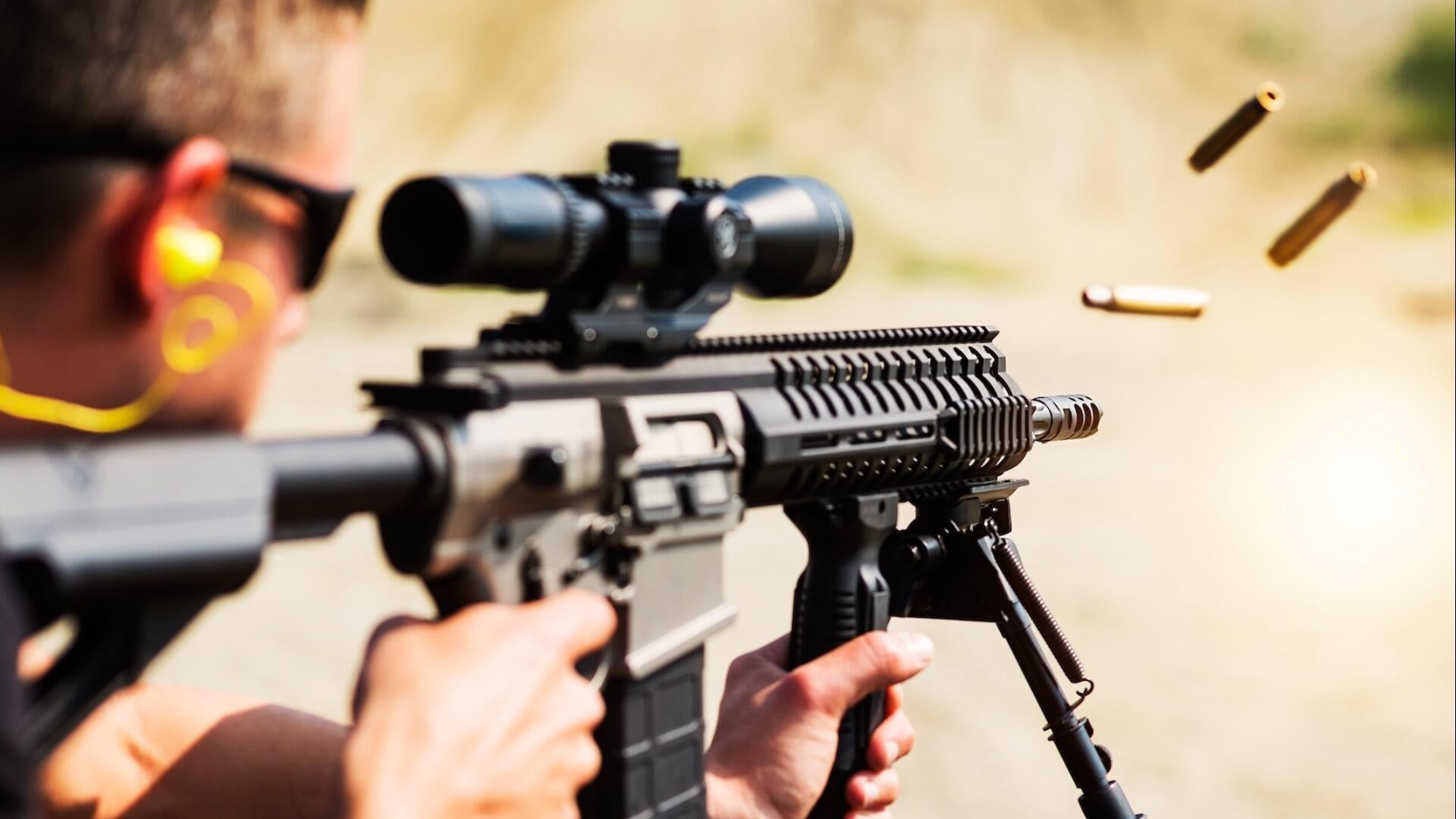Supreme Court rejects challenge to Maryland's assault weapons ban
Washington — The Supreme Court on Monday turned away a challenge to Maryland's ban on so-called assault weapons, leaving intact a lower court ruling that upheld the law.
In declining to review the decision from the U.S. Court of Appeals for the 4th Circuit, the high court skirts for now a fight over whether the Second Amendment allows states to regulate the rifles that have been used in a wave of mass shootings. Justices Clarence Thomas, Samuel Alito and Neil Gorsuch disagreed with the Supreme Court's decision to turn away the case.
The Supreme Court had already turned away the legal battle over Maryland's law last year because a federal appeals court had yet to rule. But the 4th Circuit upheld the measure last August, finding that weapons like the AR-15 could be banned in part because they are outside the scope of the Second Amendment.
But the question of whether AR-15s are protected by the Second Amendment is likely to be soon decided by the Supreme Court. In a separate statement, Justice Brett Kavanaugh said that the issue is currently being considered by other federal appeals courts, and rulings from them "should assist this court's ultimate decisionmaking." He predicted appeals to the Supreme Court will be before the court "shortly," and said the justices "should and presumably will address the AR-15 issue soon, in the next term or two."
In addition to rejecting the appeal of Maryland's prohibition, the Supreme Court declined to consider a challenge to Rhode Island's ban on large-capacity magazines, keeping the law in place. The court's decision to turn away the appeal from four gun owners and a firearms dealer leaves intact a lower court ruling that declined to block enforcement of Rhode Island's ban and found the challengers failed to show they were likely to succeed on the merits of their claims.
The two disputes are among several to land before the Supreme Court following its June 2022 ruling that expanded the right to bear arms and laid out a new framework for determining when restrictions on firearms adhere to the Constitution.
Under its new standard, the government must show that a measure is consistent with the nation's historical tradition of firearms regulation and is therefore allowed under the Second Amendment. The high court provided some clarification about its so-called historical tradition test in its last term when it upheld a federal law that bars alleged domestic abusers from temporarily having firearms, but courts have still struggled to apply the framework, leading to conflicting decisions on the constitutionality of longstanding gun laws.
Maryland's assault-weapons ban
Maryland's prohibition on certain semiautomatic rifles was enacted in the wake of the 2012 shooting at Sandy Hook Elementary School in Newtown, Connecticut. Under the law, it is a crime to possess, sell, transfer or purchase an "assault long gun" or a "copycat weapon," which encompasses 45 specific guns or their analogues. A variety of semiautomatic handguns and rifles are still , according to the Maryland State Police.
In addition to Maryland, eight other states and the District of Columbia have enacted laws restricting semiautomatic weapons.
A group of Maryland residents who want to buy rifles covered by the ban, a licensed gun dealer in the state and several pro-Second Amendment groups challenged the law in 2020, arguing that they have a Second Amendment right to own common assault rifles.
The federal district court and U.S. Court of Appeals for the 4th Circuit upheld the law, likening the banned firearms to the M-16 rifle, which the Supreme Court has said is outside the scope of Second Amendment protection.
The Maryland challengers asked the Supreme Court to review that decision, and the high court put consideration on hold while it decided another gun case involving concealed carry rules in New York. In that ruling issued in June 2022, the Supreme Court laid out the new framework under which gun laws must be consistent with the nation's historical tradition of firearms regulation.
Following its decision in that landmark gun case, the Supreme Court sent the challenge to Maryland's assault weapons back to the appeals court to reconsider the case.
After applying that new framework to Maryland's ban, the 4th Circuit concluded last year that the assault weapons ban is constitutional. Focusing on the AR-15 in particular, the appeals court found that it is most useful in military service and can be banned consistent with the Second Amendment.
It also rejected the challengers' contention that because the guns covered by Maryland's ban are commonly used, they are protected by the Constitution. Instead, the 4th Circuit said adopting this argument would mean that any dangerous weapon "could gain constitutional protection merely because it becomes popular before the government can sufficiently regulate it."
The appeals court also said that the ban is consistent with the nation's historical tradition of firearms regulation, as it "is one of many in a storied tradition of legislatures perceiving threats posed by excessively dangerous weapons and regulating commensurately."
The challengers again sought the Supreme Court's review, arguing in a that the justices should "ensure that the Second Amendment itself is not truncated into a limited right to own certain state-approved means of personal self-defense."
They argued the AR-15 is the most popular rifle in the U.S. and said the 4th Circuit's ruling "turns a firearm possessed for lawful purposes by millions of Americans into an item with not even presumptive constitutional protection."
But Maryland officials urged the court to leave the 4th Circuit's ruling intact, in part because they said it's too soon for the Supreme Court to intervene.
In his statement, Kavanaugh called the appeals court's decision "questionable."
"Given that millions of Americans own AR-15s and that a significant majority of the states allow possession of those rifles, petitioners have a strong argument that AR-15s are in 'common use' by law-abiding citizens and therefore are protected by the Second Amendment," he wrote. "If so, then the Fourth Circuit would have erred by holding that Maryland's ban on AR–15s complies with the Second Amendment."
Thomas, in a solo dissent, said the Supreme Court should not wait to decide the constitutionality of laws outlawing AR-15s and lamented that the justices have put off addressing it for a decade.
"[F]urther percolation is of little value when lower courts in the jurisdictions that ban AR-15s appear bent on distorting this court's Second Amendment precedents," he wrote. "I doubt we would sit idly by if lower courts were to so subvert our precedents involving any other constitutional right. Until we are vigilant in enforcing it, the right to bear arms will remain 'a second-class right.'"
Rhode Island's ban on large-capacity magazines
Rhode Island's ban on large-capacity magazines was enacted by its General Assembly in June 2022 in response to mass shootings that have upended communities nationwide in recent years. The law prohibits possession of magazines that hold more than 10 rounds of ammunition.
People who had these magazines had six months to either modify them to accept no more than 10 rounds, sell them to a firearms dealer, take them out of state or turn them into law enforcement. Possession of large-capacity magazines is now considered a felony.
The group of gun owners challenged the state's ban shortly before it was set to take effect, arguing it violated the Second Amendment. A federal district court judge denied the challengers' request to block the law, finding that keeping large-capacity magazines isn't conduct that is protected by the Second Amendment.
The U.S. Court of Appeals for the 1st Circuit then upheld the district court's decision, finding that the ban "imposes no meaningful burden on the ability of Rhode Island residents to defend themselves." The three-judge appeals court panel also said that semiautomatic weapons outfitted with large-capacity magazines "much more closely resemble" the M-16 rifle, which is banned for civilian use, than traditional handguns.
"The burden on self-defense imposed by [Rhode Island's law] is no greater than the burdens of longstanding, permissible arms regulations, and its justification compares favorably with the justification for prior bans on other arms found to pose growing threats to public safety," the court said. It added that, when applying the Supreme Court's framework, "our analogical reasoning very likely places LCMs well within the realm of devices that have historically been prohibited once their danger became manifest."
The gun owners appealed to the Supreme Court, arguing that lower courts have "rubber-stamped" firearms restrictions even in the wake of the high court's more recent decisions.
"The same law-abiding citizens who were unconstitutionally deprived of their right to carry arms outside the home before Bruen continue to be deprived of their right to keep arms that are common in the rest of the country," they wrote in their to the Supreme Court, citing the court's Jun 2022 decision. "The result is a nation that remains split, with the Second Amendment alive and well in (most of) the vast middle, but routinely disregarded near the coasts."
Rhode Island officials urged the Supreme Court to reject the case, saying it is not worthy of the court's attention "at this time." They noted in a that the case arrived at the high court while proceedings are still in preliminary stages.




